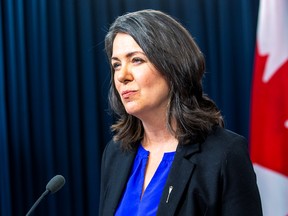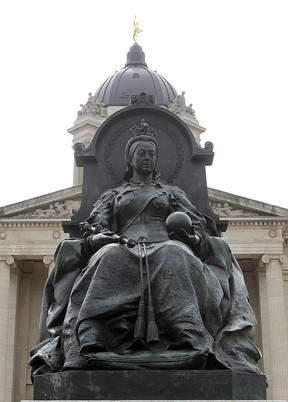It turns out provinces have always been able to openly disregard federal laws

First Reading is a daily newsletter keeping you posted on the travails of Canadian politicos, all curated by the National Post’s own Tristin Hopper. To get an early version sent directly to your inbox every Monday to Thursday at 6:30 p.m. ET (and 9 a.m. on Saturdays), sign up here.
TOP STORY
Sign up to receive the daily top stories from the National Post, a division of Postmedia Network Inc.
Thanks for signing up!
A welcome email is on its way. If you don't see it, please check your junk folder.
The next issue of NP Posted will soon be in your inbox.
The Alberta Sovereignty Act finally arrived this week. The signature legislative promise of Alberta Premier Danielle Smith, it’s a bill designed to let Albertans thumb their nose at any federal decree they deem to be “harmful” to their interests.
If passed as written, Smith could henceforth order conservation officers to ignore poachers, building inspectors to tear up federal standards and police to ignore the Criminal Code.
But here’s the twist: Provinces can already do everything noted above and more. They just generally have the discretion not to encode it into law.
Provinces aren’t allowed to break federal law, but they’ve always been able to pick and choose which parts of it they feel like taking seriously.
In 2014 – after the government of Stephen Harper effectively recriminalized prostitution in defiance of a Supreme Court decision legalizing the selling of sex – Ontario Premier Kathleen Wynne openly announced her plans to simply refuse to enforce the new law.
“The provinces can decide to nullify a new enactment simply by refusing to prosecute cases brought under this law,” Alan Young, an associate professor at Osgoode Hall Law School, told Postmedia at the time.
In the final years before Canada legalized recreational cannabis, both Ontario and B.C. explicitly tolerated widespread disobedience of the Controlled Drugs and Substances Act. When pre-legalization Vancouver was suddenly peppered with dozens of illegal cannabis dispensaries, the Vancouver Police announced they didn’t care.
Provinces have also flirted often with the idea of defying federal gun control measures.
A provincial premier would likely get arrested if they openly violated federal gun laws by, say, mailing every one of their residents an Uzi. But they can decide to be as uncooperative as possible in enforcing a federal firearms ban.
Actually, that’s sort of what Saskatchewan just did. After the Trudeau government announced a series of 11th hour amendments that would effectively criminalize most types of semi-automatic rifles, Saskatchewan responded with the Saskatchewan Firearms Act, a bill asserting provincial jurisdiction over firearms enforcement.
All of this precedent is part of why select constitutional scholars aren’t as shocked by the Sovereignty Act as one might suspect. Jack Major, a retired Supreme Court justice now living in Alberta, told the CBC this week that the act was not “particularly alarming.”
“I think it’s important to say that Alberta can’t ‘ignore’ federal law,” UBC political scientist Geoffrey Sigalet told the National Post, adding that it only allows them to slack off on “enforcing” or “cooperating” with said laws.
Which leads us to the other twist in the Alberta Sovereignty Act: Despite no shortage of pundits claiming that Danielle Smith is a power mad tyrant, Ottawa could easily crush her dreams like a bug if they felt like it.
First and foremost, the federal government maintains the power of disallowance. Every single piece of provincial legislation passed in this country could be quashed within hours by Prime Minister Justin Trudeau. He wouldn’t even have to put it up for a House of Commons vote.
Naturally, the last time Ottawa ever used this power was against Alberta – although history has generally favoured the feds on that one. After a particularly radical Social Credit government in Alberta tried to ban Hutterites from buying land in 1943, Prime Minister Mackenzie King spiked the bill.
But disallowance aside, Ottawa’s greatest power remains its control of the public purse. As noted by Postmedia columnist Don Braid, there was $68.5 billion worth of federal spending in Alberta in 2020. If the prime minister seriously believed he had a rogue province on his hand, all he’d have to do is choke off the money for a few days.
One of the best examples of Ottawa’s overwhelming financial domination is health care. As Sigalet notes, the Constitution is pretty clear that health care is a provincial domain. “The Canada Health Act cannot bind the provinces in any way because it’s actually intruding on their turf,” he said.
So the feds instead enforce fealty to the Canada Health Act by tying it to funding. Legally, there’s no reason why Alberta Premier Danielle Smith couldn’t immediately rebuild the Alberta health care system in her own image: Two-tier care, institutionalized vaccine skepticism, maybe even some Alberta-only restrictions on abortion and assisted dying.
But financially, it would be a disaster. An angry Health Canada would immediately detonate funding to every Alberta hospital, physician and ambulance it could find until the province reversed course.
And when the federal government really gets angry, they can simply expropriate provincial property. In the 1990s, B.C. Premier Glen Clark tried to block U.S. Navy access to a Vancouver Island torpedo testing range because he was protesting American fishing policy.
Obviously, provincial leaders aren’t allowed to set the terms of how Canada interacts with its foreign military allies, so the government of Prime Minister Jean Chretien took the very rare step of expropriating the testing range from B.C. control.
Ultimately, there’s no telling where the Alberta Sovereignty Act saga will lead: It’s entirely possible the legislation will embolden the Alberta cabinet to pursue a battery of previously undreamt of jurisdictional fights with Ottawa.
But the act doesn’t really change the core fundamentals that have always lain at the heart of Confederation: Provinces retain broad powers to tell the feds to stuff it, the feds retain broad powers to hegemonize the provinces, and the ever-present threat of mutually assured destruction is largely what keeps both parties at bay.
-

Carson Jerema: Surprise, Danielle Smith's sovereignty act is very likely constitutional
-

Kristopher Kinsinger: The change Alberta’s constitutionally ambiguous sovereignty act needs
IN OTHER NEWS
So, it hasn’t been a great week for anti-Semitism or Holocaust rhetoric in Canadian politics. First, there was newly returned Green Party Leader Elizabeth May, who accused Israel of being worse than Apartheid South Africa before explaining that she takes her “marching orders” on such matters from the Palestinian Authority. Then, a bunch of MPs (including May) held a “solidarity” event with a Holocaust denier. Finally, an Alberta MLA compared the federal NDP’s support for the Liberals as akin to appeasement of Adolf Hitler, and suggested the party change its name to the “National Socialist Party.”

At least the Parti Québécois likes the Alberta Sovereignty Act! This week, PQ Leader Paul St-Pierre Plamondon called it a triumph of nationalism, saying that Alberta has now definitively blown past Quebec as the most nationalistic province in the country. Plamondon has plenty of time to give press conferences these days because he’s not allowed to sit in the Quebec National Assembly by virtue of his refusal to swear an oath of allegiance to King Charles III.
Get all of these insights and more into your inbox every weekday at 6 p.m. ET by signing up for the First Reading newsletter here.


